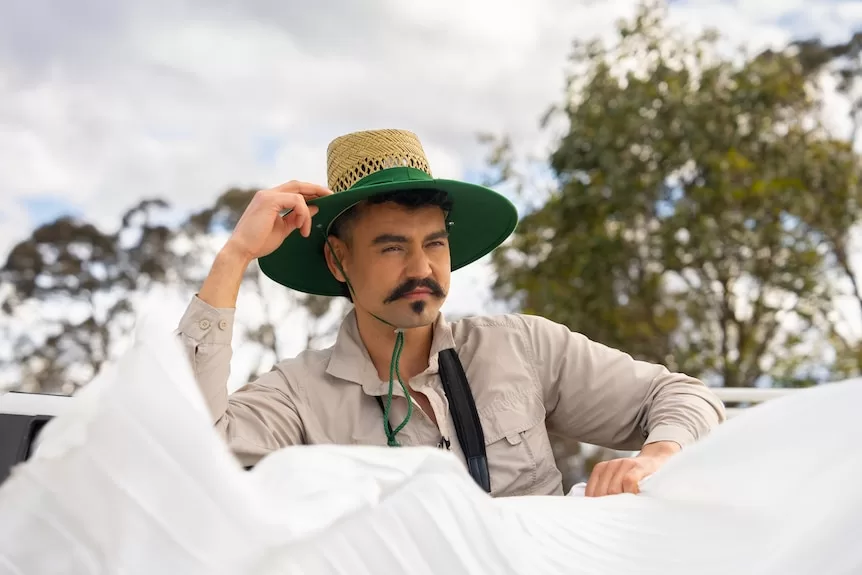- In short: Australian National University academic Dr Weliton Menário Costa, or WELI, has won the global 2024 Dance Your PhD competition for his music video Kangaroo Time.
- The video explains WELI’s research into kangaroos’ individual personalities, portrayed through diverse individuals.
- What’s next? WELI plans to stay both in the academic and creative spaces, with a new EP releasing soon and plans to continue working at ANU as a Visiting Fellow until early 2025.
A Brazilian academic has won the global Dance Your PhD award for an elaborately produced and choreographed video explaining his academic work studying social behaviour in kangaroos.
A global expert in kangaroo socialisation, 32-year-old Dr Weliton Menário Costa of the Australian National University (ANU) wrote and directed the music video Kangaroo Time (Club Edit).
The Dance Your PhD contest challenges researchers around the world to explain their research in a simple, effective and engaging way to bridge the gap between the scientific community and the general public.
“Winning this contest is the equivalent of winning Eurovision for me,” Dr Costa said.
“I think it not only shows the incredible might of the research conducted here in Australia, but also how creative we are as a nation. Even us scientists.”
He is the first person from ANU to win the Dance Your PhD competition, and just the fourth person from an Australian institution to do so since the competition began in 2008.
Known creatively as WELI, the singer-songwriter and biologist’s winning video includes a funky beat and features a variety of performers including drag queens, classical ballet dancers, urban street dancers and Brazilian funk dancers.
WELI said including this diversity of performers from a variety of disciplines and cultures was important to reflect the spectrum of personality present in kangaroo populations — the key finding of his research.
“Using diversity to communicate results has been so effective, it makes it so easy for people to clearly see differences when you actually, genuinely sample the differences,” he said.
Using a remote-controlled car WELI spent over three years studying the spectrum of behavioural differences in a group of more than 300 wild eastern grey kangaroos in Victoria.
“We found that kangaroos like to socialise in groups but prefer smaller social circles. Like humans, kangaroo personalities manifest early in life,” he said.
“Mothers and their offspring have similar personalities, and so do siblings.
“Kangaroos are very socially aware and will adjust their behaviour based off cues from other roos.”
WELI moved from Brazil to Brisbane in 2013 on a Science Without Borders scholarship for undergrad, and after returning to Brazil two years later decided he missed Australia and began applying for PhD positions in the country — eventually landing his kangaroo research with the ANU in 2017.
He said on the surface Kangaroo Time is science communication about his research utilising the creative arts medium, but the video is also a representation of his time in Australia.
“Kangaroo Time is my Australia time, it’s the time I came out and lived as a gay man in the workplace for the first time in my life,” WELI said.
“I tried to bring all these different aspects of my background — so the Latino WELI, queer WELI, the scientist WELI, the WELI that’s popular but [also] the WELI that is sad.
“There is a very important part of the lyrics that say ‘you’re surrounded by mates, are you feeling alright?’ which shows that sometimes you’re in social spaces but you’re not feeling quite well.”
WELI said his decision to apply for a PhD studying socialisation in mammals came from his upbringing in a conservative space as a queer man and noticing the differences in his behaviour while with others as opposed to alone.
“I think that all comes down from me being queer in a conservative space where I’ve always felt it’s suffocating influence of the people around me, and that was shaping my behaviour in a way that didn’t necessarily match what I actually want to be or express.”
WELI said at the core of his video is a message of inclusivity and diversity — something he hopes will be the main takeaway for viewers.
“As a queer immigrant from a linguistically diverse developing country, I understand the challenges of feeling disconnected in certain environments,” he said.
“One of the main messages I wanted to convey through this piece of work is that differences lead to diversity, and this is evident throughout the entire video. It’s evident with the different dancers that herald from various cultures and backgrounds.
“I think it’s extremely important that we celebrate diversity and creating a video explaining kangaroo personality was an excellent medium for me to do this.”
After winning the competition WELI plans to stay both in the academic and creative spaces, with a new EP called Yours Academically, Dr WELI being released soon and plans to continue working at ANU as a Visiting Fellow until early 2025.
